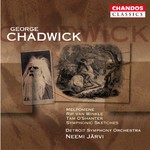
Melpomene / Rip Van Winkle / Symphonic Sketches / Tam O'shanter
 $21.59
Out of Stock
$21.59
Out of Stock6+ weeks add to cart
GEORGE CHADWICK
Melpomene / Rip Van Winkle / Symphonic Sketches / Tam O'shanter
Detroit Symphony Orchestra / Neeme Jarvi
[ Chandos Classics / CD ]
Release Date: Thursday 1 February 2007
This item is currently out of stock. It may take 6 or more weeks to obtain from when you place your order as this is a specialist product.
"Järvi offers compelling interpretations and gets the Detroit Symphony players to muster more enthusiasm and panache than they display on some of their standard-repertoire recordings. Chandos presents it all in spacious, clear, and nicely reverberant sound. If you're new to Chadwick's music, be prepared for a treat.” ClassicsToday.com
Educator, administrator, organist, conductor, and principal composer of the Second New England School, whose members also included John Knowles Paine, Horatio Parker, and Amy Marcy Beach, George W. Chadwick taught several generations of American musicians at the New England Conservatory, and came to be regarded as the standard bearer of the Yankee academic tradition in music.
Born in Lowell, MA. on November 13, 1854, Chadwick studied organ with his older brother and used his earnings as an organist to finance the musical studies which his father opposed. After leaving high school in 1872, he clerked for a brief time in his father's insurance office while studying with Dudley Buck and Eugene Thayer at the New England Conservatory. Upon graduation in 1876 he accepted an appointment as a music instructor at Mt. Olivet College in Michigan and founded the Music Teachers National Association. In 1877 Chadwick embarked on the pilgrimage which was considered de rigeur for American musicians; he sailed for Germany to study in Leipzig and Munich with such famous pedagogues as Rheinberger. His RIP VAN WINKLE OVERTURE, composed abroad to an American theme, won him some early notice, and before returning to the States in 1880, he tasted a bit of the bohemian life by tramping the Continent with a group of avant garde artists and writers called the Duvenek Boys.
New England Conservatory:
From 1877 to his appointment to the Directorship of the New England Conservatory in 1897, Chadwick built his career as a Boston teacher, organist, and composer. Among his celebrated pupils were Horatio Parker, who, in turn taught Charles Ives, Daniel Gregory Mason, and Frederick Shepherd Converse. Chadwick's compositional style has been dubbed "Boston Classicism." Though there is a distinct academic foundation to his music, his works also reflect a certain Yankee bluntness and retain the hints of his colorful vagabond days. In his mature period to which his powerful verismo opera, THE PADRONE, and his lyric drama, JUDITH, belong, Chadwick's music makes significant strides in freeing the American idiom from the German conservatory style. Sensitive, also, to indigenous influences, Chadwick made use of African-American song, Anglo-American psalmody, and folk idioms in his symphonic compositions. His 137 songs for solo voice and piano reflect a deep-seated interest in contemporary poetry in a Romantic vein. Among his best known settings are two cycles by Boston poet Arlo Bates: A FLOWER CYCLE and TOLD IN THE GATE.
(http://www.pbs.org/wnet)
Tracks:
Melpomene
Overture
Rip Van Winkle
Overture
Symphonic Sketches
Tam O'Shanter 19:36
Symphonic Ballad